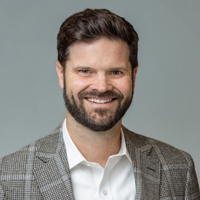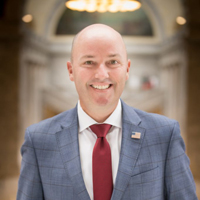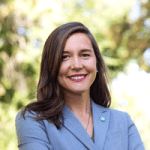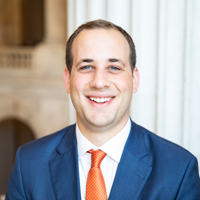
Attend the 2023 FinTech Xchange Conference
in Salt Lake City, Jan. 29-31, 2023
The University of Utah is proud to present the FinTech Xchange Summit in partnership with the Stena Foundation on Jan. 29-31, 2023.
This FinTech Xchange serves as the official launch of the University of Utah, Center for Financial Technology. This world-class Center will unite education and industry to focus collectively on accelerating financial innovation and inclusion in the State of Utah and on a global scale in a way that has not been done before.
The Center is a truly unique, cross-disciplinary partnership under the Office of the President for the University of Utah, serving as a hub between business, computer science, engineering, and law that will continue to put the State of Utah, the University of Utah and its worldwide students at the forefront of the fintech industry.
Utah is an established leader in the financial industry. With a long history of influence and innovation dating back to the first chairman of the Federal Reserve hailing from a Utah Bank to now being a recognized hub of technology, industrial loan banks, and financial services. Additional highlights for fintech in Utah include:
• 1 out of every 61 venture backed companies becoming a unicorn
• 4th largest global location for Goldman Sachs
• 8 of 10 largest industrial loan banks headquartered in Utah
• 18% growth in technology and finance employment over the last five years.
Th FinTech Xchange event serves as a convening of fintech leaders from across the country. The conference features the exciting research and thought leadership areas that inspired the University of Utah Center for Financial Technology launch.
Through an open exchange of ideas, expertise, and standards, we will drive fintech innovation and growth for all. Attendees from around the world will learn about how the new Center will be an essential part of the continued transformation of financial services and how you can benefit from its work. Attendees represent company leaders, decision-makers, regulators, and lawmakers.
As an attendee, you will learn about the newest developments in fintech with the chance for extensive networking and collaboration. Registration for the Summit is waived, thanks to generous sponsors.
[Registration Closed]
~ Conference Overview ~
Date & Time
Sunday, Jan. 29, 2023, 5 p.m. – Tuesday, Jan. 31, 2023, 2 p.m. (MST)
Location
Ken Garff Red Zone at Rice Eccles Stadium, University of Utah, 451 1400 East, SLC, UT
Sponsors



~ Agenda ~
Sunday, Jan. 29
5-7 p.m.
Networking Event (at Caffe Molise)
Monday, Jan. 30
8-9 a.m. (Networking)
Registration and Light Breakfast
9-9:15 a.m. (Keynote)
Welcome
Governor Spencer Cox opens the event with a welcome and update on the state of fintech in Utah.
Speaker: Governor Spencer Cox
9:15-10 a.m. (Keynote)
Hello! Meet the New University of Utah Center for Financial Technology
University of Utah President Taylor Randall and successful entrepreneur Steve Smith host a fireside chat to introduce the fintech center, the vision and mission behind it, and what it will mean for the future of fintech and economic development in Utah.
Speakers: Taylor Randall, Steve Smith
10-10:30 a.m.
Networking Break
10:30 a.m.- 12 p.m. (Breakout)
Consumer-Centered Financial Services: How FinTech is Transforming Access to Capital
The rise of fintech has enabled more data sources in credit-evaluation, payments processing, account opening, wage access, and government benefits. These developments can expand access to capital for businesses and individuals. Learn how this expanded data set is transforming traditional decisioning models, providing more accurate information, and enhancing the consumer experience.
Speakers: Ryan Christiansen, Stena (Moderator); Kurt Lin, Pinwheel; Lisa Kimball
10:30 a.m.- 12 p.m. (Breakout)
University Research Spotlight
Hear from university faculty about their latest research, and learn how the university is dedicating resources to advancing fintech innovation. The university, fintech center, and companies can work together to benefit from research in a cutting-edge collaboration model.
Speakers: Elena Asparouhova, Sameer Patil, and panel
12-1 p.m. (Networking)
Lunch
1-2 p.m. (Panel)
The Rise of Connected Banking in FinTech
The technology connecting fintech apps and services continues to disrupt and transform financial services. Industry veterans discuss how banking connectivity has evolved, the current opportunities, and challenges and its impact on the future of fintech.
Speakers: Jordana Cohen, Plaid; Anil Mahalaha, Akoya; Ryan Christiansen, Stena (Moderator)
1-2 p.m. (Panel)
The State of FinTech in Utah
Leaders from Utah fintech companies discuss the explosive growth of fintech in Utah over the last several years and make predictions for the future. What’s up next for the industry? And how can the state continue to support the strong fintech ecosystem?
Speakers: Jane Barratt, MX; Nick Thomas, Mastercard; Jordan Wright, Atomic; Andy Capener (Moderator)
2-2:30 p.m.
Networking Break
2:30-3:15 p.m. (Keynote)
Banking 3.0: What’s Next in the Financial Services Evolution?
Banks everywhere are leveraging new technology to streamline processes and provide better experiences to their consumers. Join industry titans in this discussion about the next iteration of banking apps, services and technology, and what it means for the future of banking.
Speakers: Matt Browning, Stena (Moderator); Derek White, Galileo; Ben Metz, Jack Henry; Andrew Lee-Stripe
3:15-5 p.m.
Networking Social
Tuesday, Jan. 31
8-9 a.m. (Networking)
Light Breakfast
9-9:15 a.m. (Keynote)
FinTech in Salt Lake City
Salt Lake City Mayor Erin Mendenhall discusses how the city is attracting new fintech companies and why fintech is an important pillar to the city’s continued economic growth and development.
Speaker: Mayor Erin Mendenhall
9:15-10 a.m. (Keynote)
Driving Financial Inclusion with FinTech Creativity
Kristy Kim is the founder and CEO of TomoCredit, a fintech startup building the future of underwriting without a traditional credit score. Learn how TomoCredit is creating new and innovative ways to assess credit worthiness for the underserved communities who are thin file or “credit invisible.”
Speaker: Kristy Kim, TomoCredit
10-10:30 a.m.
Networking Break
10:30-11:30 a.m. (Breakout)
From the Hill: An Update on the FinTech Regulatory and Legislative Environment
Join this timely discussion and take a deep dive into the current political and regulatory environment surrounding financial services. Learn what trends and legislation will potentially shape the fintech industry in the coming months and years.
Speakers: Tom Carpenter, Bryan Blom, Stephen Newton
11:30 a.m.-12 p.m. (Breakout)
Amazon Web Services
10:30 a.m.-12 p.m. (Breakout)
University Research Spotlight
Hear from university faculty about their latest research and learn how the university is dedicating resources to advancing fintech innovation. The university, fintech center, and companies can work together to benefit from research in a cutting-edge collaboration model.
Speakers: Olivia Sheng, Arul Mishra
12-12:30 p.m. (Keynote)
Wrap Up and Closing Remarks
Speaker: Ryan Christiansen, Stena
12:30-2 p.m. (Networking)
Lunch
~ Speakers ~
Elena Asparohova, David Eccles School of Business
 Elena Asparohova is the Francis A. Madsen Professor of Finance at the David Eccles School of Business. Prof. Asparouhova’s research interests are in the area of theoretical and experimental financial economics. Her work has been centered on the effects of competition in financial markets under delegation and under asymmetric information, as well as on information percolation in dark markets. Her most recent research aims at understanding human-robot interaction in financial markets, and how it impacts individual wealth and wellbeing, as well as aggregate outcomes. Her papers have received best paper awards at the Journal of Financial Markets and the Review of Finance. Prof. Asparouhova’s research has been externally funded by foundations like the National Science Foundation and the Bank of France Foundation.
Elena Asparohova is the Francis A. Madsen Professor of Finance at the David Eccles School of Business. Prof. Asparouhova’s research interests are in the area of theoretical and experimental financial economics. Her work has been centered on the effects of competition in financial markets under delegation and under asymmetric information, as well as on information percolation in dark markets. Her most recent research aims at understanding human-robot interaction in financial markets, and how it impacts individual wealth and wellbeing, as well as aggregate outcomes. Her papers have received best paper awards at the Journal of Financial Markets and the Review of Finance. Prof. Asparouhova’s research has been externally funded by foundations like the National Science Foundation and the Bank of France Foundation.
Jane Barratt, MX
 Jane Barratt, Chief Advocacy Officer of MX, is a long-time champion of financial strength. In her role at MX, Jane works with government, regulatory bodies, financial institutions and industry groups to ensure people have secure access to their financial data. She advocates for financial education through her courses on LinkedIn Learning. Previous to MX Jane was Founder & CEO of GoldBean, and spent two decades driving growth for Fortune 500 companies.
Jane Barratt, Chief Advocacy Officer of MX, is a long-time champion of financial strength. In her role at MX, Jane works with government, regulatory bodies, financial institutions and industry groups to ensure people have secure access to their financial data. She advocates for financial education through her courses on LinkedIn Learning. Previous to MX Jane was Founder & CEO of GoldBean, and spent two decades driving growth for Fortune 500 companies.
Bryan Blom, Porterfield, Fettig & Sears, LLC
 Bryan Blom is Senior Vice President of Porterfield, Fettig & Sears, LLC (PFS) where he advocates on behalf of fintechs, banks, Fortune 100 companies, asset managers, crypto companies, and trade associations navigating policy and political issues in Washington DC. He helps companies identify regulatory and legislative opportunities and risks, and formulates winning strategies associated with company interests. Blom has eighteen years of Washington DC policy experience, working on traditional and modern financial services regulation, consumer protection, securities law, tax issues and international economics. Prior to joining PFS in 2016, Blom served as the Staff Director for the Senate Banking Subcommittee on National Security, International Trade and Finance under Chairman Kirk (R-IL) in the 114th Congress. Before that, Blom served as the Minority Staff Director for the Banking Subcommittee on Securities, Insurance, and Investment under Senator Johanns (R-NE) in the 113th Congress. Blom also staffed Senator Johanns on the Financial Services Appropriations Subcommittee, which oversees the Treasury Department, Securities and Exchange Commission, Internal Revenue Service, Small Business Administration, and several other government agencies. Blom also worked in the U.S. House of Representatives for Congressman Duffy (R-WI) as Deputy Chief of Staff, handling the Congressman’s Financial Services Committee and Joint Economic Committee portfolio. A native of Wisconsin, Blom received his B.A. in Political Science from the University of Wisconsin.
Bryan Blom is Senior Vice President of Porterfield, Fettig & Sears, LLC (PFS) where he advocates on behalf of fintechs, banks, Fortune 100 companies, asset managers, crypto companies, and trade associations navigating policy and political issues in Washington DC. He helps companies identify regulatory and legislative opportunities and risks, and formulates winning strategies associated with company interests. Blom has eighteen years of Washington DC policy experience, working on traditional and modern financial services regulation, consumer protection, securities law, tax issues and international economics. Prior to joining PFS in 2016, Blom served as the Staff Director for the Senate Banking Subcommittee on National Security, International Trade and Finance under Chairman Kirk (R-IL) in the 114th Congress. Before that, Blom served as the Minority Staff Director for the Banking Subcommittee on Securities, Insurance, and Investment under Senator Johanns (R-NE) in the 113th Congress. Blom also staffed Senator Johanns on the Financial Services Appropriations Subcommittee, which oversees the Treasury Department, Securities and Exchange Commission, Internal Revenue Service, Small Business Administration, and several other government agencies. Blom also worked in the U.S. House of Representatives for Congressman Duffy (R-WI) as Deputy Chief of Staff, handling the Congressman’s Financial Services Committee and Joint Economic Committee portfolio. A native of Wisconsin, Blom received his B.A. in Political Science from the University of Wisconsin.
Matt Browning
 Matt has spent most of his career in financial services, and is currently exploring something new in the intersection of banking and fintech. Previously he was COO of Snap! Finance, a fintech lender providing retailers with a secondary finance option to reach the 40% of consumers who don’t qualify for traditional credit. Matt conceived, led and built all manner of products, functions and teams in support of serving the customer’s needs, and the company’s truly incredible growth, both domestically and internationally. His greatest passion at Snap was the team and company culture. Prior to Snap, Matt led an Industrial Bank chartering effort which resulted in his testimony before the House Committee on Oversight and Government Reform regarding the experience. Matt previously served as President of Target Bank for several years, and led innovations in prepaid cards and mobile payments. Matt also served for many years on the board of Altabank (NASDAQ: ALTA), which was recently sold to Glacier Bank (NASDAQ: GBCI). Before all of this, his career adventures span myriad companies from early stage to Fortune 100, and cross a dozen industries.
Matt has spent most of his career in financial services, and is currently exploring something new in the intersection of banking and fintech. Previously he was COO of Snap! Finance, a fintech lender providing retailers with a secondary finance option to reach the 40% of consumers who don’t qualify for traditional credit. Matt conceived, led and built all manner of products, functions and teams in support of serving the customer’s needs, and the company’s truly incredible growth, both domestically and internationally. His greatest passion at Snap was the team and company culture. Prior to Snap, Matt led an Industrial Bank chartering effort which resulted in his testimony before the House Committee on Oversight and Government Reform regarding the experience. Matt previously served as President of Target Bank for several years, and led innovations in prepaid cards and mobile payments. Matt also served for many years on the board of Altabank (NASDAQ: ALTA), which was recently sold to Glacier Bank (NASDAQ: GBCI). Before all of this, his career adventures span myriad companies from early stage to Fortune 100, and cross a dozen industries.
Tom Carpenter, Mastercard
 Tom Carpenter is the Senior Vice President for Open Banking Policy, Industry & Standards Engagement at Mastercard where he leads Mastercard’s partnerships and strategic endeavors for open banking and open finance in North America. Tom’s career has placed him at the forefront of financial services innovation for two decades. Before Mastercard, Tom led policy and public affairs for the Financial Data Exchange (FDX), and prior to that role, Tom served a host of financial services clients as a federal lobbyist and policy strategist in Washington. Tom also served as a legislative aide in the U.S. Congress. Tom has been a featured speaker in many different financial services conferences, events and government hearings over the years and his perspectives can often be found in press, media and podcasts related to open banking and open finance.
Tom Carpenter is the Senior Vice President for Open Banking Policy, Industry & Standards Engagement at Mastercard where he leads Mastercard’s partnerships and strategic endeavors for open banking and open finance in North America. Tom’s career has placed him at the forefront of financial services innovation for two decades. Before Mastercard, Tom led policy and public affairs for the Financial Data Exchange (FDX), and prior to that role, Tom served a host of financial services clients as a federal lobbyist and policy strategist in Washington. Tom also served as a legislative aide in the U.S. Congress. Tom has been a featured speaker in many different financial services conferences, events and government hearings over the years and his perspectives can often be found in press, media and podcasts related to open banking and open finance.
Ryan Christiansen, University of Utah, Center for Financial Technology
 Ryan is the executive director of the University of Utah Center for Financial Technology. In this role, Ryan directs and coordinates the labs, incubator, academic focus of the Center. Ryan previously served as senior vice president of data access partnerships at Mastercard. In this role, Ryan led the acquisition and management of consumer permissioned financial data. As an impassioned advocate for fintech, Ryan also represented Mastercard in industry efforts, which included an instrumental role in the foundation of the financial data exchange (FDX). Prior experience also includes serving as senior vice president of private banking at Zions Bank where he managed one of banks the largest credit portfolios.
Ryan is the executive director of the University of Utah Center for Financial Technology. In this role, Ryan directs and coordinates the labs, incubator, academic focus of the Center. Ryan previously served as senior vice president of data access partnerships at Mastercard. In this role, Ryan led the acquisition and management of consumer permissioned financial data. As an impassioned advocate for fintech, Ryan also represented Mastercard in industry efforts, which included an instrumental role in the foundation of the financial data exchange (FDX). Prior experience also includes serving as senior vice president of private banking at Zions Bank where he managed one of banks the largest credit portfolios.
Jordana “Jordie” Cohen, Plaid
 Jordana “Jordie” Cohen is a Product Manager at Plaid responsible for developing open banking solutions for data partners. Prior to Plaid, she worked for Visa across San Francisco, Hong Kong and London and was a founding member of Visa’s Open Banking Org, responsible for Global Product Strategy. Jordana lives in Boston (relocating to New York mid-year) with her partner and sheepadoodle, and holds a Bachelor’s Degree from the University of California, Berkeley.
Jordana “Jordie” Cohen is a Product Manager at Plaid responsible for developing open banking solutions for data partners. Prior to Plaid, she worked for Visa across San Francisco, Hong Kong and London and was a founding member of Visa’s Open Banking Org, responsible for Global Product Strategy. Jordana lives in Boston (relocating to New York mid-year) with her partner and sheepadoodle, and holds a Bachelor’s Degree from the University of California, Berkeley.
Gov. Spencer J. Cox, State of Utah
 Gov. Spencer J. Cox is a husband, father, farmer, recovering attorney, and Utah’s 18th governor. Since taking the oath of office on Jan. 4, 2021, Gov. Cox has secured funds for affordable housing, promoted suicide prevention and mental health resources and implemented water conservation and infrastructure planning. He also signed early education and workforce program funding, launched the new Utah Sustainable Health Collaborative, and expanded opportunity for women, diverse communities and those living in rural parts of the state. His efforts have contributed to Utah’s unprecedented prosperity during the COVID-19 pandemic and a historic drought. Focused on a One Utah vision, Gov. Cox advocates for civility and respect, works across party lines to find common sense solutions, and regularly participates in service projects. A sixth-generation Utahn, Gov. Cox was born and raised in Fairview, a town of 1,200 in the center of the state. He met First Lady Abby Palmer Cox at age 16 and they married after he returned from serving a church mission in Mexico. He attended Snow College, Utah State University, and the Washington and Lee University School of Law, then clerked for U.S. District Judge Ted Stewart and worked at a Salt Lake City law firm. After moving back to Fairview to raise his four children – Gavin, Kaleb, Adam, and EmmaKate – Gov. Cox began his life of public service, serving as a city councilman, mayor, county commissioner, and state legislator before being appointed to serve as Utah’s lieutenant governor in 2013.
Gov. Spencer J. Cox is a husband, father, farmer, recovering attorney, and Utah’s 18th governor. Since taking the oath of office on Jan. 4, 2021, Gov. Cox has secured funds for affordable housing, promoted suicide prevention and mental health resources and implemented water conservation and infrastructure planning. He also signed early education and workforce program funding, launched the new Utah Sustainable Health Collaborative, and expanded opportunity for women, diverse communities and those living in rural parts of the state. His efforts have contributed to Utah’s unprecedented prosperity during the COVID-19 pandemic and a historic drought. Focused on a One Utah vision, Gov. Cox advocates for civility and respect, works across party lines to find common sense solutions, and regularly participates in service projects. A sixth-generation Utahn, Gov. Cox was born and raised in Fairview, a town of 1,200 in the center of the state. He met First Lady Abby Palmer Cox at age 16 and they married after he returned from serving a church mission in Mexico. He attended Snow College, Utah State University, and the Washington and Lee University School of Law, then clerked for U.S. District Judge Ted Stewart and worked at a Salt Lake City law firm. After moving back to Fairview to raise his four children – Gavin, Kaleb, Adam, and EmmaKate – Gov. Cox began his life of public service, serving as a city councilman, mayor, county commissioner, and state legislator before being appointed to serve as Utah’s lieutenant governor in 2013.
Kristy Kim, TomoCredit
 Kristy built TomoCredit out of her own personal frustration as a young, female immigrant. She got rejected from auto loan five different times when she was studying at UC Berkeley as an international student. Without a credit score, she could not get approved for anything. She built TomoCredit for over 30M people who were just like her and never got the chance to start building credit. Kristy is a fintech expert who worked on both sides of the table– as an investor and a startup founder. Prior to starting TomoCredit, Kristy was in VC. Outside of work, Kristy is a guest lecturer at UC Berkeley teaching entrepreneurship and passionate about mentoring the next generation of leaders.
Kristy built TomoCredit out of her own personal frustration as a young, female immigrant. She got rejected from auto loan five different times when she was studying at UC Berkeley as an international student. Without a credit score, she could not get approved for anything. She built TomoCredit for over 30M people who were just like her and never got the chance to start building credit. Kristy is a fintech expert who worked on both sides of the table– as an investor and a startup founder. Prior to starting TomoCredit, Kristy was in VC. Outside of work, Kristy is a guest lecturer at UC Berkeley teaching entrepreneurship and passionate about mentoring the next generation of leaders.
Lisa Kimball
 Lisa is an experienced banking and financial services leader with over 20 years of experience guiding teams in product development, strategic relationships and business transformation. In her latest role at Mastercard, Lisa worked with customers, partners, and industry innovators to advance the use of and creative thought around consumer-permissioned financial data through open banking. Lisa and her team have created next gen customer experiences to streamline lending processes, expand credit access and improve consumer financial awareness. Lisa leverages broad expertise in strategic planning, business transformation, program management, bank operations and finance gained during her tenure in the financial services industry.
Lisa is an experienced banking and financial services leader with over 20 years of experience guiding teams in product development, strategic relationships and business transformation. In her latest role at Mastercard, Lisa worked with customers, partners, and industry innovators to advance the use of and creative thought around consumer-permissioned financial data through open banking. Lisa and her team have created next gen customer experiences to streamline lending processes, expand credit access and improve consumer financial awareness. Lisa leverages broad expertise in strategic planning, business transformation, program management, bank operations and finance gained during her tenure in the financial services industry.
Andrew Lee, Stripe
 Andrew is the Head of New Financial Products, Partner Management for Stripe. Prior to Stripe, he worked at Airbnb ($ABNB), Robinhood ($HOOD), and MIRROR (acquired by lululemon). Andrew is a United States Marine Corps veteran and holds a MBA from UC Berkeley.
Andrew is the Head of New Financial Products, Partner Management for Stripe. Prior to Stripe, he worked at Airbnb ($ABNB), Robinhood ($HOOD), and MIRROR (acquired by lululemon). Andrew is a United States Marine Corps veteran and holds a MBA from UC Berkeley.
Kurt Lin, Pinwheel
 Kurt Lin is co-founder & CEO of Pinwheel, the leading payroll connectivity API. The son of two immigrant parents, Kurt saw how the lack of credit history created a greater struggle for them to access and secure financial products. This experience became a driving force for him and his co-founders to create Pinwheel. Kurt has been involved in multiple startup acquisitions, first Idean and later with Luxe. Following Luxe’s acquisition by Volvo, he received an HSA and experienced similar challenges to those of his parents. He realized if you didn’t have money to pre-fund an account – which most Americans don’t – opening an HSA was basically impossible. Kurt and his co-founders set out to create a more automated HSA process and soon realized the key problem was actually inaccessibility to the data and controls in payroll systems. Thus, Pinwheel was born with the mission to build a fairer financial system.
Kurt Lin is co-founder & CEO of Pinwheel, the leading payroll connectivity API. The son of two immigrant parents, Kurt saw how the lack of credit history created a greater struggle for them to access and secure financial products. This experience became a driving force for him and his co-founders to create Pinwheel. Kurt has been involved in multiple startup acquisitions, first Idean and later with Luxe. Following Luxe’s acquisition by Volvo, he received an HSA and experienced similar challenges to those of his parents. He realized if you didn’t have money to pre-fund an account – which most Americans don’t – opening an HSA was basically impossible. Kurt and his co-founders set out to create a more automated HSA process and soon realized the key problem was actually inaccessibility to the data and controls in payroll systems. Thus, Pinwheel was born with the mission to build a fairer financial system.
Anil Mahalaha, Akoya
 Anil Mahalaha is the Chief Evangelist at Akoya. Prior to this Anil has held various positions at Akoya including Head of Solution, Product Manager, and Head of Development. Anil is a founding employee of Akoya. Anil is also a founding member of the Financial Data Exchange (FDX) where he continues to co-chair the API Working Group and the Technical Review Committee. Anil is a member of the FDX Executive Steering Committee, and he participates is numerous FDX Taskforces. Anil has 35 years of experience in the Financial Services Industry. Prior to joining Akoya, Anil was Vice President, Architecture at Fidelity Investments.
Anil Mahalaha is the Chief Evangelist at Akoya. Prior to this Anil has held various positions at Akoya including Head of Solution, Product Manager, and Head of Development. Anil is a founding employee of Akoya. Anil is also a founding member of the Financial Data Exchange (FDX) where he continues to co-chair the API Working Group and the Technical Review Committee. Anil is a member of the FDX Executive Steering Committee, and he participates is numerous FDX Taskforces. Anil has 35 years of experience in the Financial Services Industry. Prior to joining Akoya, Anil was Vice President, Architecture at Fidelity Investments.
Erin Mendenhall, Salt Lake City
 Erin Mendenhall was sworn in as the 36th Mayor of Salt Lake City on January 6, 2020. Prior to being elected Mayor, Erin represented District 5 on the City Council for six years, including one year as its chair. She is the first mayor in Salt Lake City history to have been publicly elected from the City Council. As Mayor, Erin is working hard to make Salt Lake City more environmentally and economically resilient, and to take advantage of the region’s historic period of economic opportunity. She is determined to ensure every Salt Laker — no matter their neighborhood, economic or housing status, faith, race, or sexual or gender identity — can access all the city has to offer. Erin’s love for the extraordinary people of Salt Lake City drives an unrelenting commitment to bringing people from different walks of life together in pursuit of results for the entire city.
Erin Mendenhall was sworn in as the 36th Mayor of Salt Lake City on January 6, 2020. Prior to being elected Mayor, Erin represented District 5 on the City Council for six years, including one year as its chair. She is the first mayor in Salt Lake City history to have been publicly elected from the City Council. As Mayor, Erin is working hard to make Salt Lake City more environmentally and economically resilient, and to take advantage of the region’s historic period of economic opportunity. She is determined to ensure every Salt Laker — no matter their neighborhood, economic or housing status, faith, race, or sexual or gender identity — can access all the city has to offer. Erin’s love for the extraordinary people of Salt Lake City drives an unrelenting commitment to bringing people from different walks of life together in pursuit of results for the entire city.
Arul Mishra, David Eccles School of Business
 Arul Mishra is the Emma Eccles Jones Chair Professor of Marketing and Adjunct Professor, School of Computing at the University of Utah. She received a PhD in Marketing from the University of Iowa. Her research, on a broader level, uses machine learning methods to understand customer decisions and guide firm strategies. Specifically, she derives theoretical and practical insights from data using computational algorithms to understand customer engagement in digital markets, customer preference and choice, financial decisions, online advertising, and creativity. Currently her research involves leveraging language and generative models for business applications. She also examines the ethical consequences of using algorithms. Can algorithms exacerbate or reduce the impact of social biases and inequities? How can algorithms help firms make better decisions? Methodologically she uses Natural Language Processing, generative language models, image processing and field studies to test social phenomenon and theories. Arul’s research has been published in the Journal of Marketing Research, Journal of Consumer Research, Journal of Marketing, Marketing Science, Management Science, Journal of Personality and Social Psychology, Organizational Behavior and Human Decision Processes, Psychological Science, American Psychologist. Popular accounts of her work have appeared in the Scientific American, Los Angeles Times, Wall Street Journal, Chicago Tribune, MSN Money, The Financial Express, and Shape. Arul teaches or has taught several courses at the Eccles School of Business including Algorithms for Business Decisions for Master students, Consumer Analytics for undergraduate students, and doctoral course on research theory and methods.
Arul Mishra is the Emma Eccles Jones Chair Professor of Marketing and Adjunct Professor, School of Computing at the University of Utah. She received a PhD in Marketing from the University of Iowa. Her research, on a broader level, uses machine learning methods to understand customer decisions and guide firm strategies. Specifically, she derives theoretical and practical insights from data using computational algorithms to understand customer engagement in digital markets, customer preference and choice, financial decisions, online advertising, and creativity. Currently her research involves leveraging language and generative models for business applications. She also examines the ethical consequences of using algorithms. Can algorithms exacerbate or reduce the impact of social biases and inequities? How can algorithms help firms make better decisions? Methodologically she uses Natural Language Processing, generative language models, image processing and field studies to test social phenomenon and theories. Arul’s research has been published in the Journal of Marketing Research, Journal of Consumer Research, Journal of Marketing, Marketing Science, Management Science, Journal of Personality and Social Psychology, Organizational Behavior and Human Decision Processes, Psychological Science, American Psychologist. Popular accounts of her work have appeared in the Scientific American, Los Angeles Times, Wall Street Journal, Chicago Tribune, MSN Money, The Financial Express, and Shape. Arul teaches or has taught several courses at the Eccles School of Business including Algorithms for Business Decisions for Master students, Consumer Analytics for undergraduate students, and doctoral course on research theory and methods.
Stephen Newton, Porterfield, Fettig & Sears, LLC
 Stephen Newton is Vice President of Porterfield, Fettig & Sears, LLC (PFS) where he provides strategic advice to banks, fintechs, and payment companies on how to best navigate Congress and federal regulatory agencies. Newton has nearly a decade of Capitol Hill experience working on insurance and bank regulations, securities law, and tax policy. Prior to joining the firm, Newton served as Senior Policy Advisor and Deputy Legislative Director to Senator Mitt Romney (R-UT). In that capacity, Newton served as a key advisor during the 117th Congress, successfully navigating an evenly split Senate to produce bipartisan accomplishments, ranging from the Chips and Science Act to the Infrastructure Investment and Jobs Act. He also led the Senator’s successful efforts to protect Utah’s Industrial Loan Company (ILC) charter as it came under fire from both Democrats and Republicans in Congress. Newton also served as a Legislative Assistant to Senator John Kennedy (R-LA) where he led the Senator’s work on the Committee on Banking, Housing, and Urban Development. Earlier in his career, Newton worked in the Office of the Chief Economist for the American Bankers Association, and for the Senate Committee on Small Business and Entrepreneurship. A native of Tennessee, Newton received his Bachelor of Science in Finance from Samford University in Birmingham, AL.
Stephen Newton is Vice President of Porterfield, Fettig & Sears, LLC (PFS) where he provides strategic advice to banks, fintechs, and payment companies on how to best navigate Congress and federal regulatory agencies. Newton has nearly a decade of Capitol Hill experience working on insurance and bank regulations, securities law, and tax policy. Prior to joining the firm, Newton served as Senior Policy Advisor and Deputy Legislative Director to Senator Mitt Romney (R-UT). In that capacity, Newton served as a key advisor during the 117th Congress, successfully navigating an evenly split Senate to produce bipartisan accomplishments, ranging from the Chips and Science Act to the Infrastructure Investment and Jobs Act. He also led the Senator’s successful efforts to protect Utah’s Industrial Loan Company (ILC) charter as it came under fire from both Democrats and Republicans in Congress. Newton also served as a Legislative Assistant to Senator John Kennedy (R-LA) where he led the Senator’s work on the Committee on Banking, Housing, and Urban Development. Earlier in his career, Newton worked in the Office of the Chief Economist for the American Bankers Association, and for the Senate Committee on Small Business and Entrepreneurship. A native of Tennessee, Newton received his Bachelor of Science in Finance from Samford University in Birmingham, AL.
Sameer Patil, University of Utah, Kahlert School of Computing
 Sameer Patil is an Associate Professor in the Kahlert School of Computing at the University of Utah. Previously, he has held several academic and industry appointments, including at Indiana University Bloomington, New York University, University of Siegen, Helsinki Institute for Information Technology (HIIT), Vienna University of Economics and Business, Yahoo Research, IBM Research, and Avaya Labs Research. Sameer’s research involves human-centered investigations of security and privacy issues in the design, deployment, and use of technology. He holds eight US patents related to mobile technologies. Sameer has received research funding from the National Science Foundation (NSF), Department of Homeland Security (DHS), Google, and Utah System of Higher Education (USHE), and he was a recipient of the the NSF CAREER award in 2019. Sameer obtained a Ph.D. in Computer and Information Science from the University of California, Irvine and holds Master’s degrees in Computer Science & Engineering and Information from the University of Michigan, Ann Arbor.
Sameer Patil is an Associate Professor in the Kahlert School of Computing at the University of Utah. Previously, he has held several academic and industry appointments, including at Indiana University Bloomington, New York University, University of Siegen, Helsinki Institute for Information Technology (HIIT), Vienna University of Economics and Business, Yahoo Research, IBM Research, and Avaya Labs Research. Sameer’s research involves human-centered investigations of security and privacy issues in the design, deployment, and use of technology. He holds eight US patents related to mobile technologies. Sameer has received research funding from the National Science Foundation (NSF), Department of Homeland Security (DHS), Google, and Utah System of Higher Education (USHE), and he was a recipient of the the NSF CAREER award in 2019. Sameer obtained a Ph.D. in Computer and Information Science from the University of California, Irvine and holds Master’s degrees in Computer Science & Engineering and Information from the University of Michigan, Ann Arbor.
President Taylor Randall, University of Utah
 Taylor R. Randall was selected by the Utah Board of Higher Education as the 17th president of the University of Utah in August 2021. An award-winning educator, innovative leader, and champion of higher education, he comes to the position with more than two decades of experience at the U, serving as both dean of and an accounting professor in the David Eccles School of Business. He is the first alumnus since 1973 to serve as president. Randall began his tenure building on the momentum established by his predecessors, declaring a bold vision to make the U a top 10 public university with unsurpassed societal impact. His strategy outlines three objectives: to inspire a new generation of students by revolutionizing the student experience, innovate and generate discoveries that change the world, and impact the lives of all 3.3 million Utahns. The vision includes goals to increase enrollment to 40,000 students and secure $1 billion in research funding annually.
Taylor R. Randall was selected by the Utah Board of Higher Education as the 17th president of the University of Utah in August 2021. An award-winning educator, innovative leader, and champion of higher education, he comes to the position with more than two decades of experience at the U, serving as both dean of and an accounting professor in the David Eccles School of Business. He is the first alumnus since 1973 to serve as president. Randall began his tenure building on the momentum established by his predecessors, declaring a bold vision to make the U a top 10 public university with unsurpassed societal impact. His strategy outlines three objectives: to inspire a new generation of students by revolutionizing the student experience, innovate and generate discoveries that change the world, and impact the lives of all 3.3 million Utahns. The vision includes goals to increase enrollment to 40,000 students and secure $1 billion in research funding annually.
Olivia Sheng, University of Utah, David Eccles School of Business
 Olivia Sheng is Presidential Professor and Emma Eccles Jones Presidential Chair of Information Systems at the David Eccles School of Business, University of Utah. She is one of the inaugural faculty directors for the Data Science & Ethics of Technology (DATASET) Initiative of the One Utah Data Science Hub. She founded the Global Knowledge Management Center in 2003 to seek research and education extension of business analytics, and has organized one of the first academic conferences on business analytics since 2005. Dr. Sheng’s research focuses on predictive and prescriptive analytics, some based on deep learning methods, to address the needs in healthcare, marketing, social media, business relationship and performance, human resource, investment, products and operations management. Her research has received funding from U.S. Food and Drug Administration, National Science Foundation, Overstock, Yahoo!, U.S. Army, IBM Tivoli, Toshiba Corp., Sun Microsystems, SAP University Alliance, and Wasatch Advisors. Currently, she engages companies in Utah such as Backcountry, Utah Transit Authority, University of Utah Health Services, and Intermountain Healthcare Company to collaborate on research and capstone projects related to big data analysis. Along with her collaborators, she was a recipient of the 2017 INFORMS Design Science Award. In 2021, Dr. Sheng became one of the INFORMS Information Systems Society (ISS) Distinguished Fellows. Her research publications received various media attention and professional recognition. Dr. Sheng received the B.S. degree from the National Chiao Tung University in Taiwan, R.O.C. and the Master’s and Ph.D. Degrees in Computers and Information Systems from the University of Rochester. Prior to University of Utah, she was on faculty of Management Information Systems (MIS) at the University of Arizona from 1985 to 2002, and was University of Arizona’s MIS Department Head from 1997 to 2002. Since 1995, Dr. Sheng visited and taught globally at different institutions including Hong Kong University of Science and Technology, Tokyo Institute of Technology, Shanghai Jiao Tong University, and Molde University College in Norway.
Olivia Sheng is Presidential Professor and Emma Eccles Jones Presidential Chair of Information Systems at the David Eccles School of Business, University of Utah. She is one of the inaugural faculty directors for the Data Science & Ethics of Technology (DATASET) Initiative of the One Utah Data Science Hub. She founded the Global Knowledge Management Center in 2003 to seek research and education extension of business analytics, and has organized one of the first academic conferences on business analytics since 2005. Dr. Sheng’s research focuses on predictive and prescriptive analytics, some based on deep learning methods, to address the needs in healthcare, marketing, social media, business relationship and performance, human resource, investment, products and operations management. Her research has received funding from U.S. Food and Drug Administration, National Science Foundation, Overstock, Yahoo!, U.S. Army, IBM Tivoli, Toshiba Corp., Sun Microsystems, SAP University Alliance, and Wasatch Advisors. Currently, she engages companies in Utah such as Backcountry, Utah Transit Authority, University of Utah Health Services, and Intermountain Healthcare Company to collaborate on research and capstone projects related to big data analysis. Along with her collaborators, she was a recipient of the 2017 INFORMS Design Science Award. In 2021, Dr. Sheng became one of the INFORMS Information Systems Society (ISS) Distinguished Fellows. Her research publications received various media attention and professional recognition. Dr. Sheng received the B.S. degree from the National Chiao Tung University in Taiwan, R.O.C. and the Master’s and Ph.D. Degrees in Computers and Information Systems from the University of Rochester. Prior to University of Utah, she was on faculty of Management Information Systems (MIS) at the University of Arizona from 1985 to 2002, and was University of Arizona’s MIS Department Head from 1997 to 2002. Since 1995, Dr. Sheng visited and taught globally at different institutions including Hong Kong University of Science and Technology, Tokyo Institute of Technology, Shanghai Jiao Tong University, and Molde University College in Norway.
Steve Smith, Stena Foundation
 Steve is founder and chairman of the Stena Foundation. He believes that financial inclusion and quality education can be a catalyst for change and can break the chains of generational poverty to lift local economies. A 35-year serial entrepreneur in the Utah tech community, Steve was most recently the Chairman, CEO, and Co-Founder of Finicity, an industry innovation platform providing consumer-permissioned financial data and insights. He was the creative force behind many of the company’s offerings for financial data APIs, including credit decisioning tools, financial management, wellness and inclusion solutions. Steve has built a strong reputation with customers and partners for developing disruptive, creative strategies that deliver market efficiencies, enable new business models and provide better experiences for consumers. Steve is a proud alum of the University of Utah finance program and a big fan of the Utah Utes.
Steve is founder and chairman of the Stena Foundation. He believes that financial inclusion and quality education can be a catalyst for change and can break the chains of generational poverty to lift local economies. A 35-year serial entrepreneur in the Utah tech community, Steve was most recently the Chairman, CEO, and Co-Founder of Finicity, an industry innovation platform providing consumer-permissioned financial data and insights. He was the creative force behind many of the company’s offerings for financial data APIs, including credit decisioning tools, financial management, wellness and inclusion solutions. Steve has built a strong reputation with customers and partners for developing disruptive, creative strategies that deliver market efficiencies, enable new business models and provide better experiences for consumers. Steve is a proud alum of the University of Utah finance program and a big fan of the Utah Utes.
Nick Thomas
 Father, Founder, Futurist, Technologist, Inventor, Investor, Financial Inclusionist, and Storyteller. In Jan 2023, I retired from a 30-year career as an engineer, technologist, product guy, entrepreneur and serial startup founder. Most recently, I transitioned my startup, Finicity, to Mastercard leadership then spent a year defining global Open Banking strategies to expand financial inclusion and deepen consumer empowerment in those markets. I’m passionate about building a global, interoperable data fabric and ecosystem, standardizing #digitaltrust, and building towards a future where data rights are legislated and technology deployed to put people in full control of their data, engaging with the digital world pseudonymously. Ask me about Shirley Temples and Red Vines.
Father, Founder, Futurist, Technologist, Inventor, Investor, Financial Inclusionist, and Storyteller. In Jan 2023, I retired from a 30-year career as an engineer, technologist, product guy, entrepreneur and serial startup founder. Most recently, I transitioned my startup, Finicity, to Mastercard leadership then spent a year defining global Open Banking strategies to expand financial inclusion and deepen consumer empowerment in those markets. I’m passionate about building a global, interoperable data fabric and ecosystem, standardizing #digitaltrust, and building towards a future where data rights are legislated and technology deployed to put people in full control of their data, engaging with the digital world pseudonymously. Ask me about Shirley Temples and Red Vines.
Derek White, Galileo
 Derek White is the CEO of Galileo Financial Technologies as well as Head of SoFi International. Derek has been a pioneer in digital banking and financial technologies for more than two-decades, having helped launch the world’s first online bank, before selling it and helping numerous organizations modernize their systems and evolve their approaches to customer and client service. Prior to joining Galileo, Derek was vice president of Global Financial Services at Google Cloud, responsible for partnering with banks, insurance companies, fintechs and other financial services entities to redefine their core business units and transition to leading-edge, digital-first operations. Earlier in his career, he was vice chair and chief digital officer for U.S. Bank, global head of client solutions for BBVA and chief design and digital officer at Barclays. He also served as the technology ambassador for London, actively promoting the U.K. market as a fintech capital. Derek holds an MBA from The Wharton School of the University of Pennsylvania and a bachelor’s degree from Utah State University. He lives in Utah with his wife and their four children.
Derek White is the CEO of Galileo Financial Technologies as well as Head of SoFi International. Derek has been a pioneer in digital banking and financial technologies for more than two-decades, having helped launch the world’s first online bank, before selling it and helping numerous organizations modernize their systems and evolve their approaches to customer and client service. Prior to joining Galileo, Derek was vice president of Global Financial Services at Google Cloud, responsible for partnering with banks, insurance companies, fintechs and other financial services entities to redefine their core business units and transition to leading-edge, digital-first operations. Earlier in his career, he was vice chair and chief digital officer for U.S. Bank, global head of client solutions for BBVA and chief design and digital officer at Barclays. He also served as the technology ambassador for London, actively promoting the U.K. market as a fintech capital. Derek holds an MBA from The Wharton School of the University of Pennsylvania and a bachelor’s degree from Utah State University. He lives in Utah with his wife and their four children.
Jordan Wright, Atomic
 Jordan Wright is the Co-Founder and Chief Executive Officer of Atomic as well as a shareholder and a member of its board of directors. Prior to starting Atomic, Jordan was the Co-Founder and Chief Executive Officer at Unbill, a FinTech payment company he sold to online banking software provider Q2 (QTWO). Previously, he helped start a cybersecurity company, NextPage, that was acquired by Proofpoint (PFPT). Jordan earned his B.S. from Brigham Young University in 2012. He is the Vice Chairman of the Board of Directors of Solera National Bank. In his spare time, he enjoys fishing with family.
Jordan Wright is the Co-Founder and Chief Executive Officer of Atomic as well as a shareholder and a member of its board of directors. Prior to starting Atomic, Jordan was the Co-Founder and Chief Executive Officer at Unbill, a FinTech payment company he sold to online banking software provider Q2 (QTWO). Previously, he helped start a cybersecurity company, NextPage, that was acquired by Proofpoint (PFPT). Jordan earned his B.S. from Brigham Young University in 2012. He is the Vice Chairman of the Board of Directors of Solera National Bank. In his spare time, he enjoys fishing with family.
